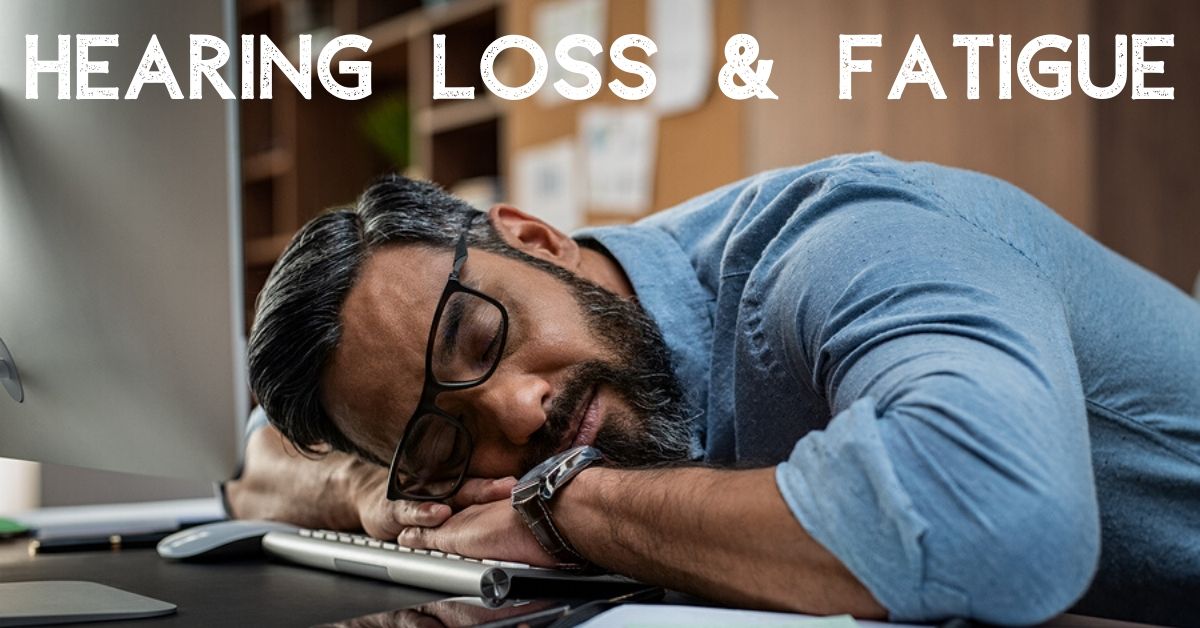
Hearing Loss & Fatigue
It is becoming more and more common to occupy ourselves at every moment throughout the day, often for the sake of productivity. This can have adverse effects on your health. If you feel more tired than usual at the end of the day, believe it or not, you may want to have your hearing checked. A condition called listening fatigue could be affecting you based on increased effort to listen brought on by untreated hearing loss.
How The Brain Helps You Hear
The brain plays an important role in our hearing function and is integral to speech and comprehension, too. The National Institute on Deafness and Other Communication Disorders states that sound waves travel through the ear canal to the eardrum, which then vibrates and sends that information to three tiny bones in the middle ear: the malleus, incus, and stapes. They amplify the sound and send it to the cochlea, in the inner ear, which causes the fluid therein to vibrate and the hair cells to attract stereocilia. As the cells with the stereocilia bend, “pore-like” channels open up and chemicals flood into the cells and create an electrical signal. This signal travels along the auditory nerve to the brain to be translated into recognizable sounds.
When any part of this system is not working properly, the brain has to over-compensate which can lead to listening fatigue.
There are three parts of the brain that work together when normal hearing is present:
- Temporal lobe – one of its processes is deriving meaning from sensory input into language comprehension
- Wernicke’s area – important for language development and comprehension (spoken and written)
- Broca’s area – important for speech production and (spoken and written) articulation
How Hearing Aids Can Help
If you experience headaches or migraines often, it could be a result of listening fatigue from a hearing loss. You can take that as a sign to get you to an audiologist’s office for a hearing examination. Hearing aids can help by filtering and focusing sound into the ear canal to be sent to the brain via the cochlear nerve. Hearing loss has a connection to listening fatigue and other conditions like depression, social isolation, balance, and anxiety. Yet, many people choose not get their hearing checked for fear of needing a hearing aid and the social stigma associated with it.
A study from Vanderbilt University looked at how hearing aids would affect listening effort and mental fatigue. In 2011, 16 adults with mild to severe sensorineural hearing loss, ages 47-69, participated in the study. Researchers tested word recognition, word recall and more while participants wore hearing aids and while they did not. The results worsened for people without hearing aids as the study went on and mirrored development of mental fatigue. When the participants wore hearing aids during the study, however, researchers found no evidence of mental fatigue.
Treating Listening Fatigue
You do not need to have a hearing loss to suffer from listening fatigue. If you believe you are experiencing listening fatigue, you can practice these tips for some relief until you are able to have your hearing checked:
- Quiet Time
Take a break from the noise throughout the day. If you wear hearing aids, take them out for a few minutes each day. If you do not wear hearing aids, enjoy a quiet walk in nature or find a spot to rest your eyes for ten minutes. Finding quiet places to have your lunch or reading a book instead of watching a screen can also give your brain a listening break.
- Deep Breathing
Regain focus, calm anxious nerves, and clear your mind by practicing deep breathing exercises. They can borrow from your spiritual or physical practice, or you can download an app for your mobile device to guide you.
- Eliminate Environmental Noise
Eliminate unnecessary background noise. It can be difficult for people with hearing loss to discern speech through environmental noise. Turn off televisions or radios and find quieter public spaces to converse with friends and loved ones.
Prevent Listening Fatigue with Better Hearing Health
An estimated 48 million Americans are living with disabling hearing loss. It is the third most common chronic physical condition of adults 18 and over. Beginning to implement some of these practices into your hearing health routine could lessen your risk for things like social anxiety, isolation, and even depression.
Absolute Audio
If you think you have a hearing loss and are experiencing fatigue throughout the day as you never have before, contact Absolute Audio for a hearing exam. For the sake of your mental and hearing health, get your hearing checked and do not ignore listening fatigue! Contact us today.
